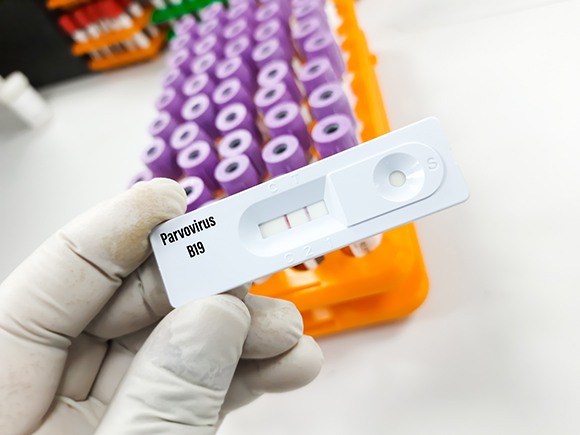Parvo-like Disease is Parvo: But Why Are Dogs Testing Negative?

By Caroline Coile
The mysterious parvo-like disease is parvo.
The illness has been described as “parvo-like” because it has the same symptoms, such as vomiting and bloody stool, as canine parvovirus, but affected dogs have consistently tested negative for parvo at their local veterinary clinics and shelters. Now the Michigan State University Veterinary Diagnostic Laboratory (MSU VDL) has confirmed that the illness is in fact canine parvovirus.
“Screening tests for parvo are done to help guide immediate isolation, disinfection, and treatment protocols,” explainsMSU VDL director Kim Dodd, DVM. “While those tests are valuable in the clinical setting, they are not as sensitive as the diagnostic tests we can perform here in the laboratory. We continue to further characterize the virus in hopes of better understanding why those animals were testing negative on screening tests.”
Veterinarians with suspected cases are urged to contact MSU VDL to submit samples for further testing.
The disease was first reported in northern Michigan but has since reportedly spread to southern Michigan. It has killed at least 60 dogs there so far, with dogs succumbing within three days of initial symptoms despite supportive care.
Despite initial reports that vaccinated dogs were among those affected, the MSU VDL states that none of the affected dogs had completed a full course of canine parvovirus vaccinations.
The parvovirus vaccine is highly effective but must be administered on a specific time schedule and the vaccine must be kept at an exact temperature to work. Several Michigan breeders and exhibitors are giving their dogs “parvo-only” boosters as a precaution.
The Michigan Department of Agriculture and Rural Development (MDARD) is making the following recommendations:
• Keep up with routine vaccinations by ensuring dogs/puppies are vaccinated against canine parvovirus, rabies, canine distemper, adenovirus, parainfluenza, and leptospirosis by a veterinarian.
• Have dogs/puppies fully vaccinated before interacting with other animals to keep them healthy and safe.
• Keep dogs/puppies at home and away from other dogs if they are exhibiting any signs of illness and contact your veterinarian.
• Be sure to clean up after your pet when you’re walking them in public.
“Dogs that are not fully vaccinated against this virus are the most at risk,” Wineland said. “Dog owners across Michigan must work closely with their veterinarians to ensure their dogs are appropriately vaccinated and given timely boosters to keep their pets safe and healthy.”
MDARD states that owners need not drastically change how they travel or care for their dogs as long as the dogs are fully vaccinated.
#ParvoLike #Parvo #CanineHealth

Short URL: https://caninechronicle.com/?p=242808
Comments are closed











